Abstract
A series of monoclonal antibodies to T cell surface antigens were used to characterize peripheral lymphoid populations from patients with a variety of immunodeficiency diseases. Several disorders of T cell differentiation were observed to occur in severe combined immunodeficiency. One subtype of severe combined immunodeficiency was associated with failure to develop lymphocytes that express any thymus specific antigens, another with failure to differentiate beyond the early prothymocyte-thymocyte (T9+, T10+) stage, while a third subtype was associated with failure to differentiate beyond a late thymocyte (T3+, T4+, T5+/T8+, T10+) stage. In contrast, patients with thymic aplasia (DiGeorge syndrome) had a diminished but detectable population of mature T cells. Imbalances in immunoregulatory T cells with a relative excess of suppressor cells were found in 9 of 17 patients with spontaneously occurring acquired agammaglobulinemia. In one of the latter individuals, there was an activated suppressor T cell population expressing Ia antigens (T+/T8+, Ia+). Another had no inducer T4+ cells. Patients with X-linked agammaglobulinemia frequently had an abnormal ratio of inducer to suppressor cells as well as an absence of circulating surface immunoglobulin-bearing cells. No such abnormalities were noted in normals or individuals with selective immunoglobulin (Ig)A deficiency. Taken together, these findings support the notion that several immunodeficiency states may occur as a consequence of defective T cell maturation or imbalances in immunoregulatory T lymphocyte subpopulations.
Full text
PDF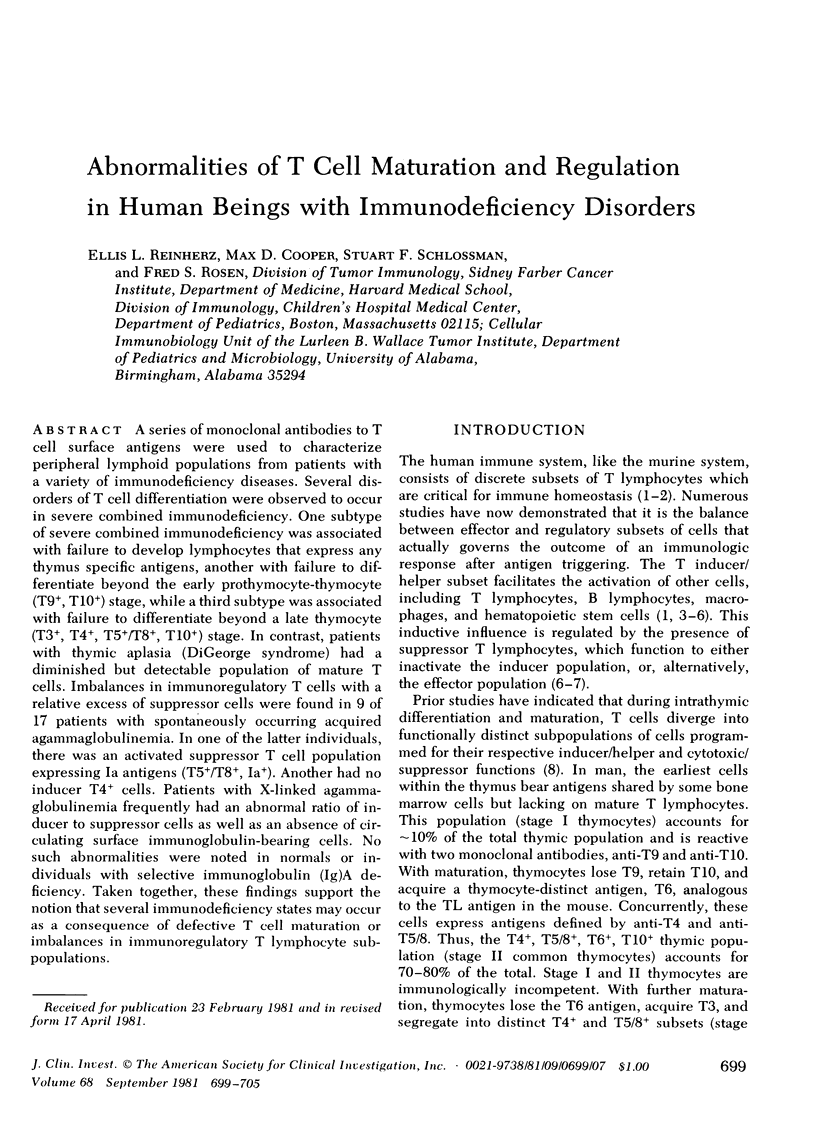
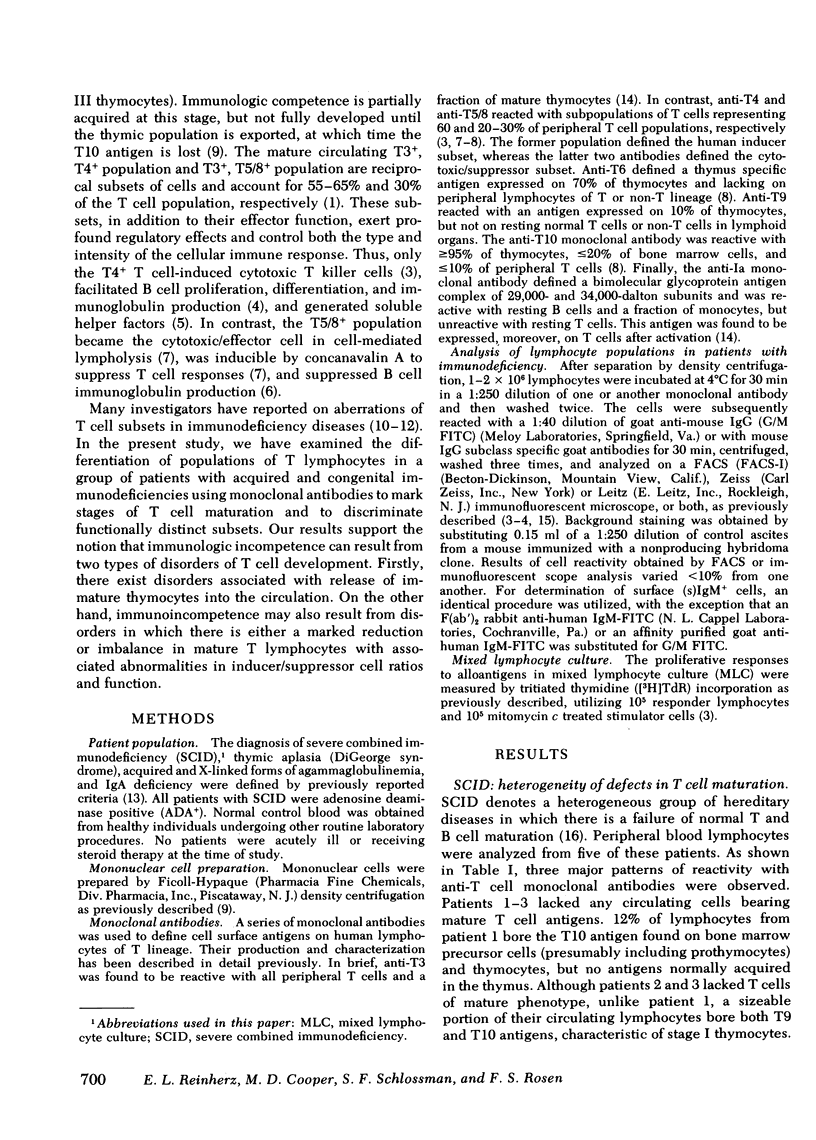
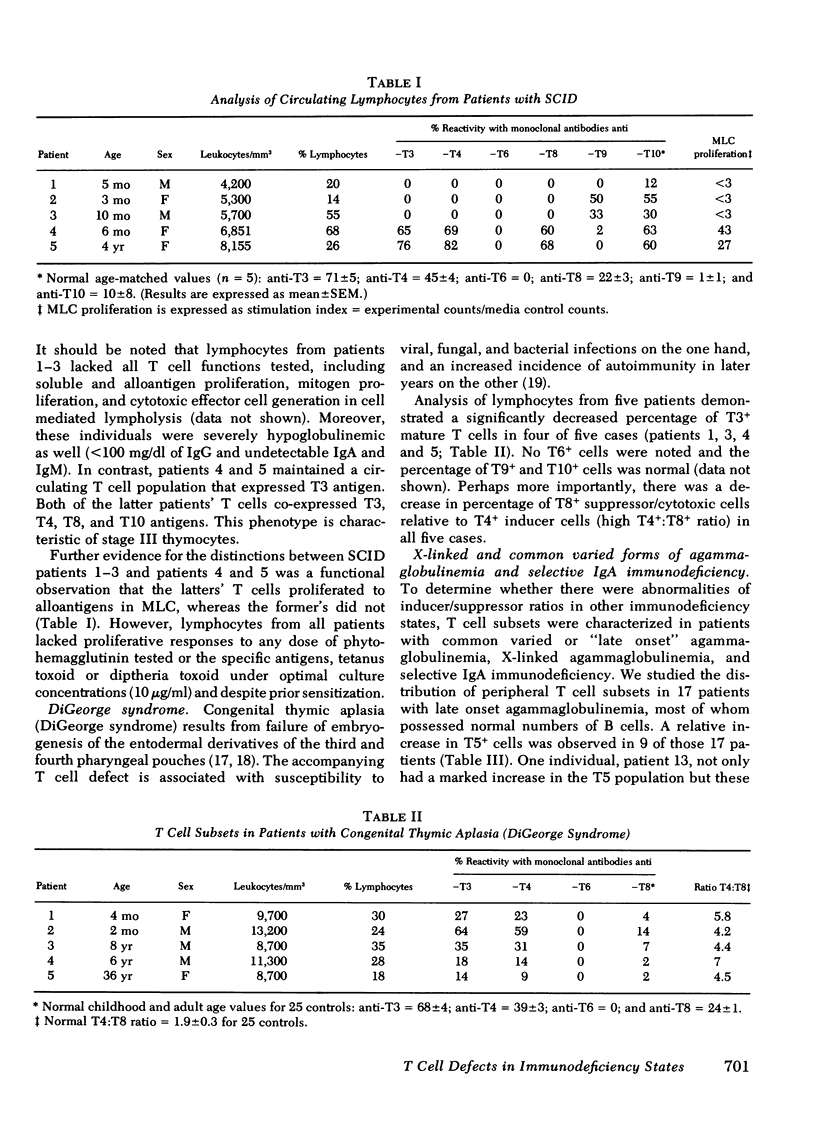
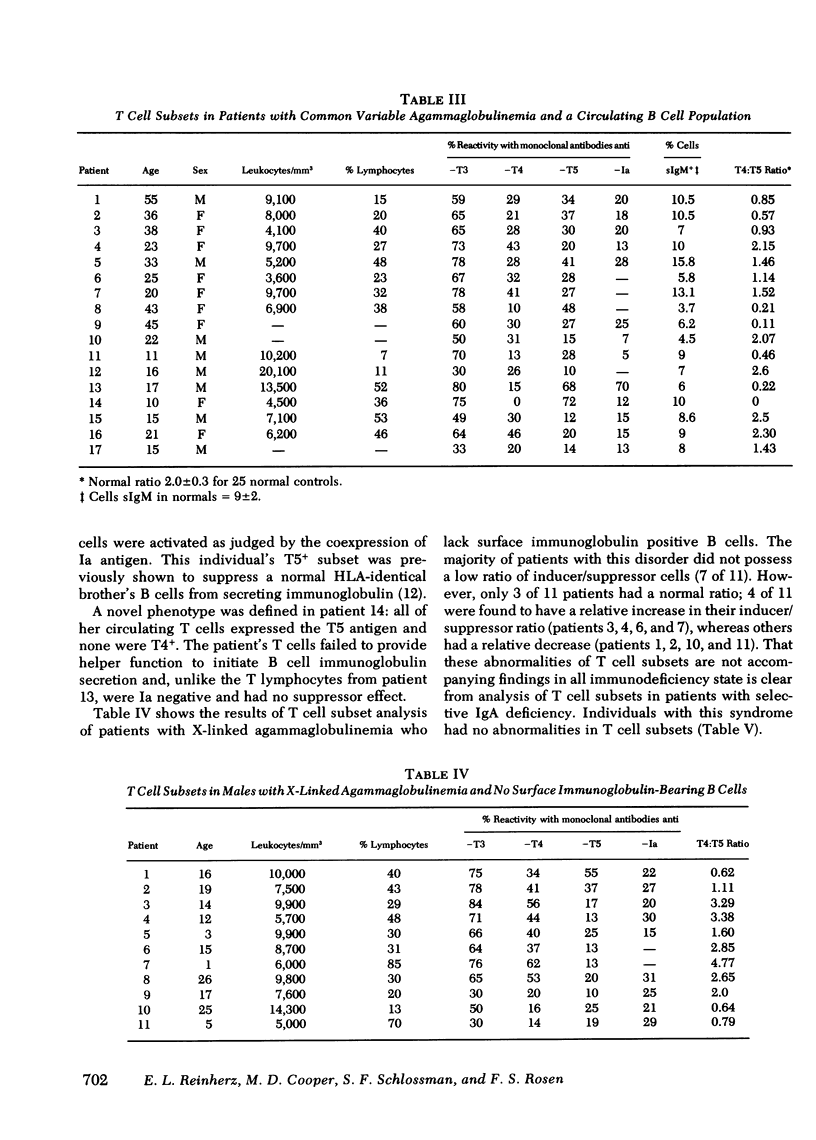
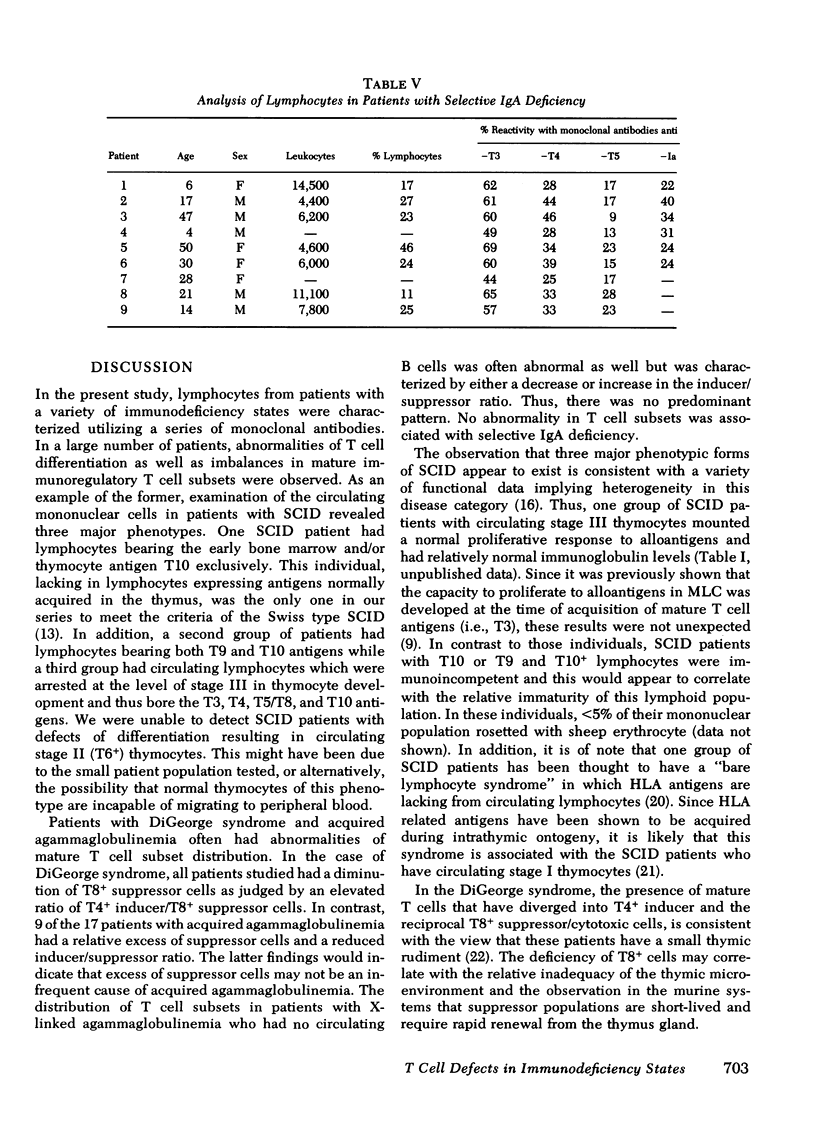
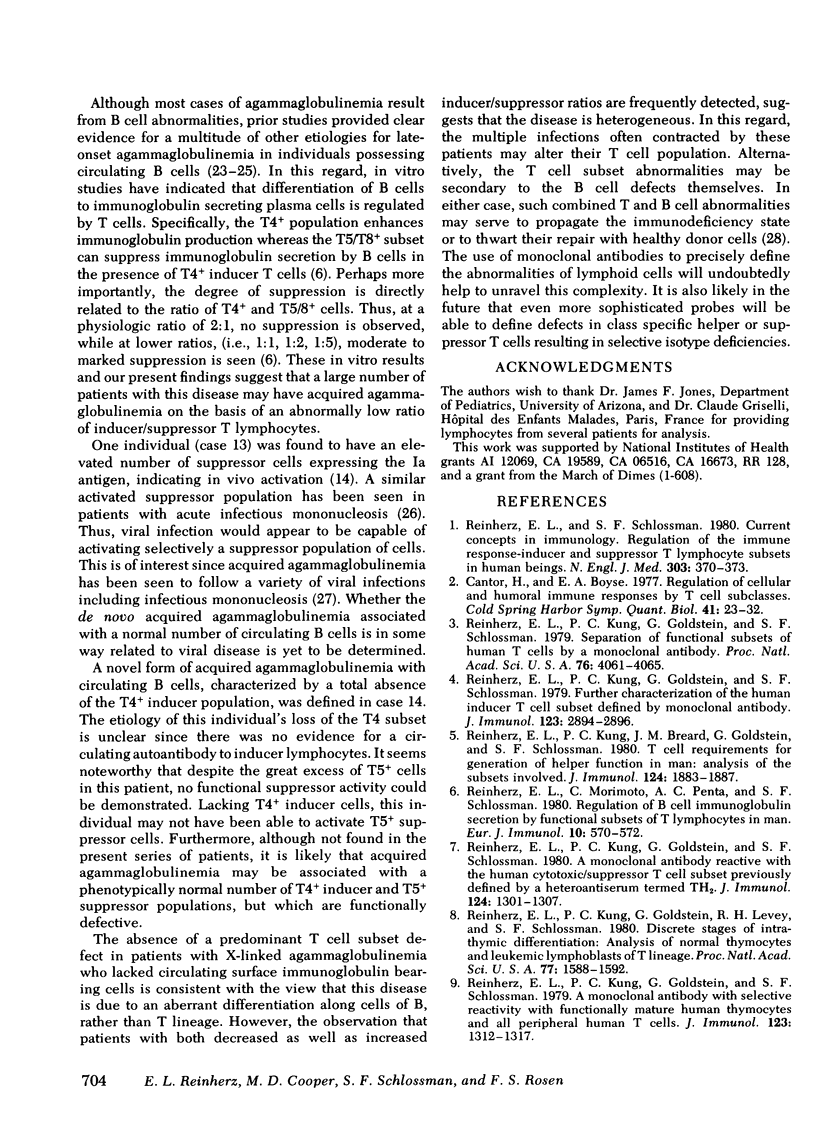
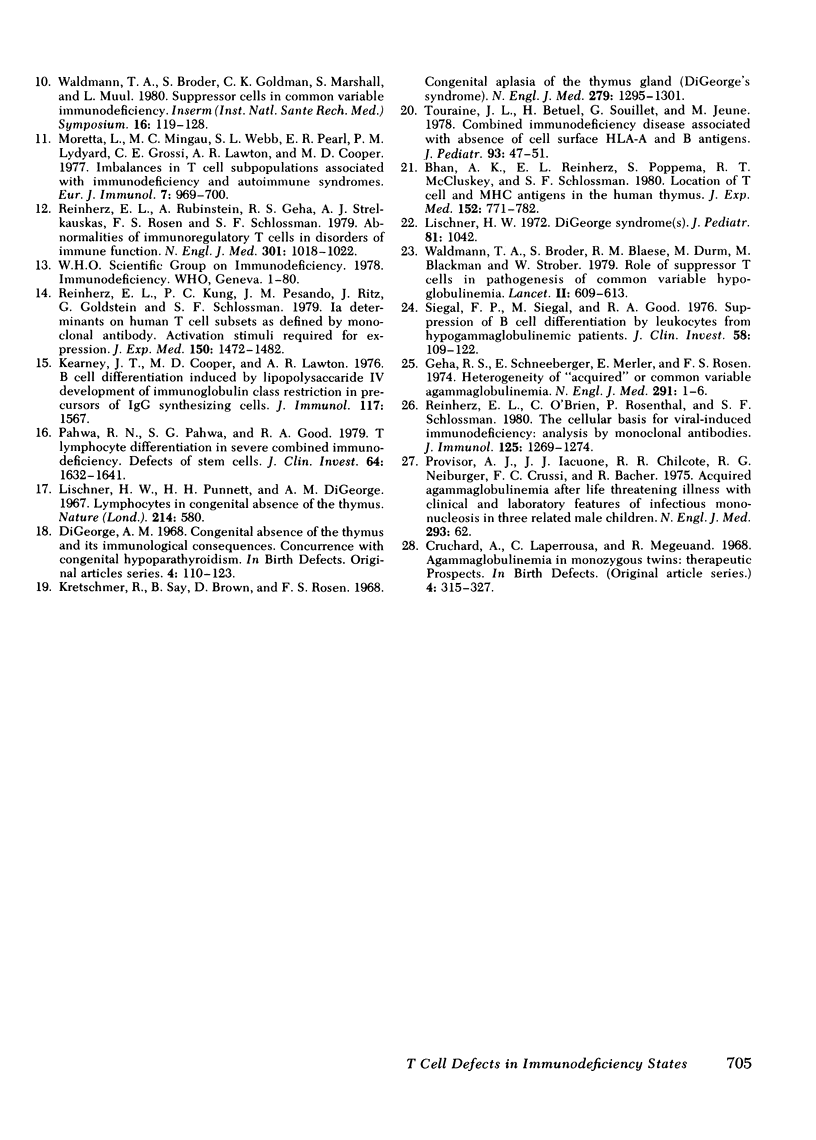
Selected References
These references are in PubMed. This may not be the complete list of references from this article.
- Bhan A. K., Reinherz E. L., Poppema S., McCluskey R. T., Schlossman S. F. Location of T cell and major histocompatibility complex antigens in the human thymus. J Exp Med. 1980 Oct 1;152(4):771–782. doi: 10.1084/jem.152.4.771. [DOI] [PMC free article] [PubMed] [Google Scholar]
- Cantor H., Boyse E. A. Regulation of cellular and humoral immune responses by T-cell subclasses. Cold Spring Harb Symp Quant Biol. 1977;41(Pt 1):23–32. doi: 10.1101/sqb.1977.041.01.006. [DOI] [PubMed] [Google Scholar]
- Geha R. S., Schneeberger E., Merler E., Rosen F. S. Heterogeneity of "acquired" or common variable agammaglobulinemia. N Engl J Med. 1974 Jul 4;291(1):1–6. doi: 10.1056/NEJM197407042910101. [DOI] [PubMed] [Google Scholar]
- Kearney J. F., Cooper M. D., Lawton A. R. B cell differentiation induced by lipopolysaccharide. IV. Development of immunoglobulin class restriction in precursors of IgG-synthesizing cells. J Immunol. 1976 Nov;117(5 Pt 1):1567–1572. [PubMed] [Google Scholar]
- Kretschmer R., Say B., Brown D., Rosen F. S. Congenital aplasia of the thymus gland (DiGeorge's syndrome). N Engl J Med. 1968 Dec 12;279(24):1295–1301. doi: 10.1056/NEJM196812122792401. [DOI] [PubMed] [Google Scholar]
- Lischner H. W. DiGeorge syndrome(s). J Pediatr. 1972 Nov;81(5):1042–1044. doi: 10.1016/s0022-3476(72)80575-4. [DOI] [PubMed] [Google Scholar]
- Moretta L., Mingari M. C., Webb S. R., Pearl E. R., Lydyard P. M., Grossi C. E., Lawton A. R., Cooper M. D. Imbalances in T cell subpopulations associated with immunodeficiency and autoimmune syndromes. Eur J Immunol. 1977 Oct;7(10):696–700. doi: 10.1002/eji.1830071009. [DOI] [PubMed] [Google Scholar]
- Pahwa R. N., Pahwa S. G., Good R. A. T-lymphocyte differentiation in vitro in severe combined immunodeficiency. Defects of stem cells. J Clin Invest. 1979 Dec;64(6):1632–1641. doi: 10.1172/JCI109625. [DOI] [PMC free article] [PubMed] [Google Scholar]
- Provisor A. J., Iacuone J. J., Chilcote R. R., Neiburger R. G., Crussi F. G. Acquired agammaglobulinemia after a life-threatening illness with clinical and laboratory features of infectious mononucleosis in three related male children. N Engl J Med. 1975 Jul 10;293(2):62–65. doi: 10.1056/NEJM197507102930202. [DOI] [PubMed] [Google Scholar]
- Reinherz E. L., Kung P. C., Breard J. M., Goldstein G., Schlossman S. F. T cell requirements for generation of helper factor(s) in man: analysis of the subsets involved. J Immunol. 1980 Apr;124(4):1883–1887. [PubMed] [Google Scholar]
- Reinherz E. L., Kung P. C., Goldstein G., Levey R. H., Schlossman S. F. Discrete stages of human intrathymic differentiation: analysis of normal thymocytes and leukemic lymphoblasts of T-cell lineage. Proc Natl Acad Sci U S A. 1980 Mar;77(3):1588–1592. doi: 10.1073/pnas.77.3.1588. [DOI] [PMC free article] [PubMed] [Google Scholar]
- Reinherz E. L., Kung P. C., Goldstein G., Schlossman S. F. A monoclonal antibody reactive with the human cytotoxic/suppressor T cell subset previously defined by a heteroantiserum termed TH2. J Immunol. 1980 Mar;124(3):1301–1307. [PubMed] [Google Scholar]
- Reinherz E. L., Kung P. C., Goldstein G., Schlossman S. F. A monoclonal antibody with selective reactivity with functionally mature human thymocytes and all peripheral human T cells. J Immunol. 1979 Sep;123(3):1312–1317. [PubMed] [Google Scholar]
- Reinherz E. L., Kung P. C., Goldstein G., Schlossman S. F. Further characterization of the human inducer T cell subset defined by monoclonal antibody. J Immunol. 1979 Dec;123(6):2894–2896. [PubMed] [Google Scholar]
- Reinherz E. L., Kung P. C., Goldstein G., Schlossman S. F. Separation of functional subsets of human T cells by a monoclonal antibody. Proc Natl Acad Sci U S A. 1979 Aug;76(8):4061–4065. doi: 10.1073/pnas.76.8.4061. [DOI] [PMC free article] [PubMed] [Google Scholar]
- Reinherz E. L., Kung P. C., Pesando J. M., Ritz J., Goldstein G., Schlossman S. F. Ia determinants on human T-cell subsets defined by monoclonal antibody. Activation stimuli required for expression. J Exp Med. 1979 Dec 1;150(6):1472–1482. doi: 10.1084/jem.150.6.1472. [DOI] [PMC free article] [PubMed] [Google Scholar]
- Reinherz E. L., Morimoto C., Penta A. C., Schlossman S. F. Regulation of B cell immunoglobulin secretion by functional subsets of T lymphocytes in man. Eur J Immunol. 1980 Jul;10(7):570–572. doi: 10.1002/eji.1830100715. [DOI] [PubMed] [Google Scholar]
- Reinherz E. L., O'Brien C., Rosenthal P., Schlossman S. F. The cellular basis for viral-induced immunodeficiency: analysis by monoclonal antibodies. J Immunol. 1980 Sep;125(3):1269–1274. [PubMed] [Google Scholar]
- Reinherz E. L., Rubinstein A., Geha R. S., Strelkauskas A. J., Rosen F. S., Schlossman S. F. Abnormalities of immunoregulatory T cells in disorders of immune function. N Engl J Med. 1979 Nov 8;301(19):1018–1022. doi: 10.1056/NEJM197911083011902. [DOI] [PubMed] [Google Scholar]
- Reinherz E. L., Schlossman S. F. Current concepts in immunology: Regulation of the immune response--inducer and suppressor T-lymphocyte subsets in human beings. N Engl J Med. 1980 Aug 14;303(7):370–373. doi: 10.1056/NEJM198008143030704. [DOI] [PubMed] [Google Scholar]
- Sequiera L. W., Jennings L. C., Carrasco L. H., Lord M. A., Curry A., Sutton R. N. Detection of herpes-simplex viral genome in brain tissue. Lancet. 1979 Sep 22;2(8143):609–612. doi: 10.1016/s0140-6736(79)91667-2. [DOI] [PubMed] [Google Scholar]
- Siegal F. P., Siegal M., Good R. A. Suppression of B-cell differentiation by leukocytes from hypogammaglobulinemic patients. J Clin Invest. 1976 Jul;58(1):109–122. doi: 10.1172/JCI108439. [DOI] [PMC free article] [PubMed] [Google Scholar]
- Touraine J. L., Betuel H., Souillet G., Jeune M. Combined immunodeficiency disease associated with absence of cell-surface HLA-A and -B antigens. J Pediatr. 1978 Jul;93(1):47–51. doi: 10.1016/s0022-3476(78)80598-8. [DOI] [PubMed] [Google Scholar]


